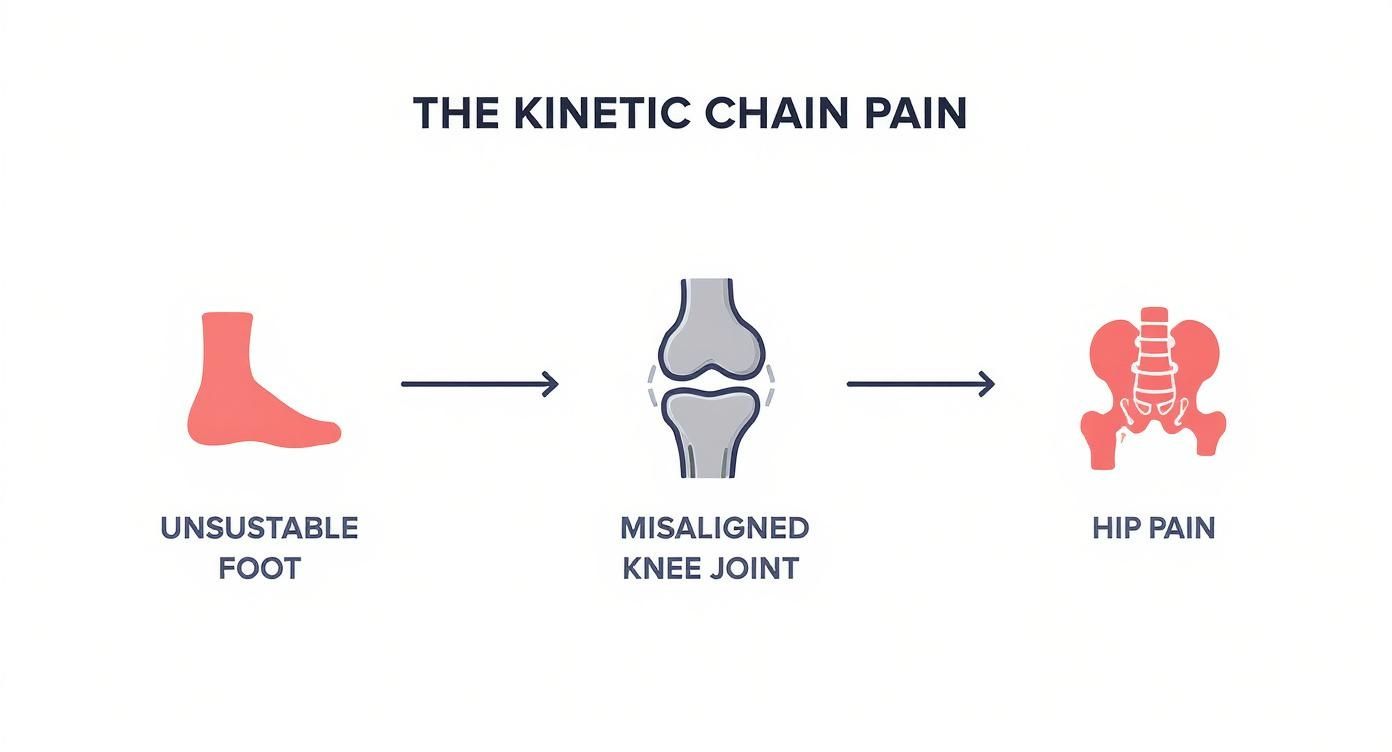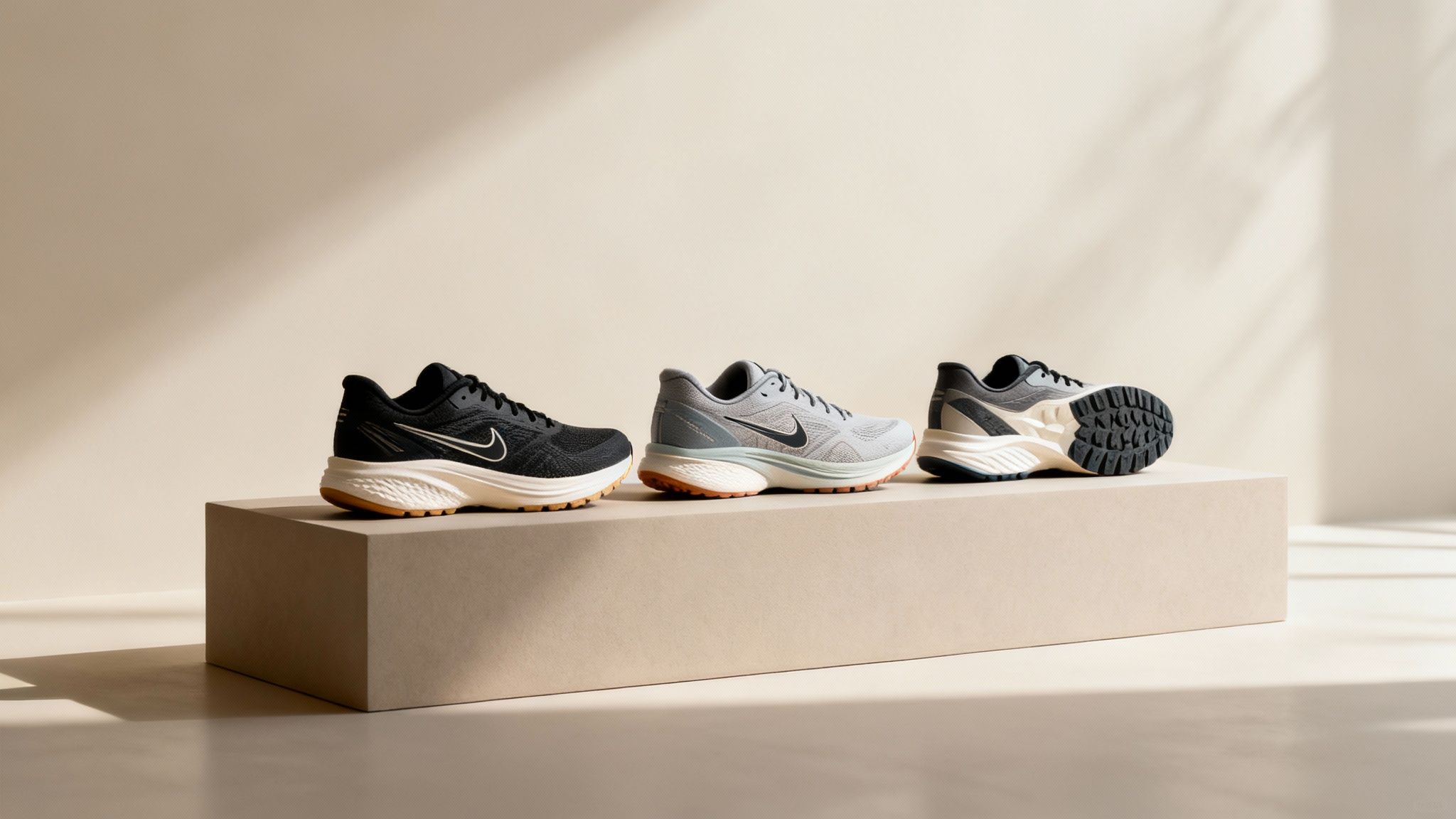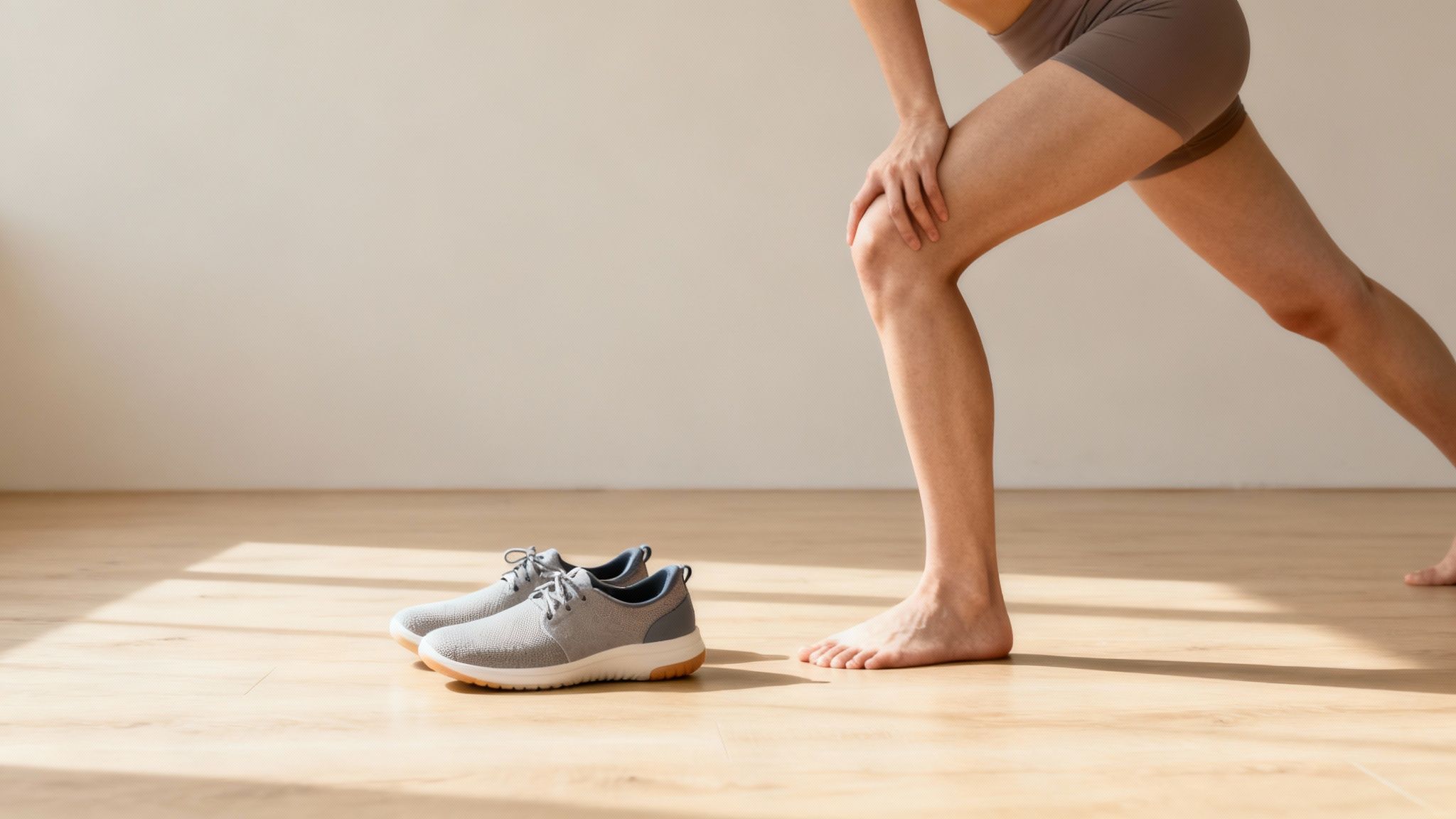Finding the Best Shoes for Hip Pain Relief
- Flourish Everyday Health And Fitness

- Oct 23, 2025
- 9 min read
Updated: Oct 28, 2025
When your hips are screaming, the last thing you might think to blame is your shoes. Buying the best shoes for hip pain relief can be a game changer. We're talking shoes with excellent cushioning, stable arch support, and a design that keeps your foot properly aligned. Brands like Hoka and Brooks nail this for athletic wear, while options from Vionic offer great everyday support to tackle the root causes of that nagging hip pain.

In This Guide:
How Your Shoes Affect Hip Pain
There's a direct connection between your feet and your hips. Think of your feet as the foundation of a house. If that foundation is uneven, the whole structure above it feels the strain, and your hips often bear the worst of it. This whole body connection is what experts call the kinetic chain. A problem that starts in your feet, like poor arch support or inadequate cushioning, sends a ripple effect up your legs, altering how your knees and hips absorb shock with every step.
When your shoes lack a solid base, it can lead to overpronation, where your foot rolls too far inward. This forces your entire leg to rotate internally, placing unnatural stress directly on the hip joint.
The Growing Need for Supportive Footwear
More people are recognizing how footwear impacts their overall health. The global orthopedic footwear market is booming, with a valuation somewhere between USD 4.37 billion and USD 10.67 billion (Future Market Insights, 2024; Research Nester, 2024).
This growth is partly due to an aging population. The number of people over 60 is set to double by 2050, meaning more joint issues are on the horizon. At least one in four older adults experiences foot pain, much of which can lead to referred pain in the hips.
Key Takeaways on Footwear and Hip Health
Swapping your shoes is a powerful first step for relief. By choosing footwear that corrects alignment and cushions your step, you tackle a major contributor to hip strain.
Poor Support Causes Misalignment: Shoes without good arch support create an unstable walk, forcing your hips to overcompensate.
Inadequate Cushioning Increases Impact: Worn out soles let the full force of each step jolt your legs and hip joints.
The Right Shoes Restore Balance: Supportive shoes help realign your feet, correcting your posture and taking pressure off your hips.
Decoding Essential Shoe Features for Hip Pain
To find the right shoes, you need to understand why certain features matter. Think of a shoe’s midsole cushioning like a car's suspension, it absorbs shock and protects your entire body. When shoes lack the right structure, your foot becomes unstable, setting off a chain reaction of misalignment that travels right up to your hip.
This infographic shows how an unstable foot leads to a misaligned knee and subsequent hip pain.

Your foot is the foundation. If it's wobbly, every joint above it is compromised, putting significant strain on your hips. Let's break down the key features that create a solid, supportive base.
Comparison: Key Shoe Features for Hip Pain Relief
Feature | What It Does | How It Helps Relieve Hip Pain |
|---|---|---|
Superior Cushioning | Absorbs shock from ground impact. | Reduces jarring forces that travel up your leg to the hip joints with each step. |
Firm Arch Support | Prevents the foot's arch from collapsing inward (overpronation). | Keeps your ankle, knee, and hip properly aligned, reducing rotational stress on the hip joint. |
Firm Heel Counter | A rigid cup at the back of the shoe that secures the heel. | Prevents heel wobbling, which stabilizes the entire leg and minimizes hip strain. |
Wide, Stable Outsole | Provides a broader base of support for the entire foot. | Increases stability and prevents foot rolling, helping maintain a balanced gait. |
Rocker Bottom Sole | A curved sole that helps the foot roll smoothly from heel to toe. | Eases the walking motion and reduces the required flexion of hip and ankle joints. |
Cushioning: The Foundation of Comfort
Great cushioning is nonnegotiable for easing hip pain. A well cushioned shoe acts as a buffer, absorbing a huge amount of the impact that travels up your leg with each step. Look for shoes with midsoles made from materials like EVA foam or Gel technologies, which are designed to absorb force effectively. This is crucial for anyone who spends significant time on hard surfaces.
Arch Support: The Key to Alignment
Firm arch support is arguably the most critical feature. Your foot's arch is its natural shock absorber. When it collapses (overpronation), your whole leg rotates inward, pulling the hip joint out of its natural alignment and causing strain. Good arch support holds your foot in its proper shape, preventing this inward roll and ensuring your ankle, knee, and hip stay correctly stacked.
The demand for such features is growing. In North America, the orthotic insoles market was valued at USD 1.81 billion, driven by rising awareness of conditions like arthritis and improved footwear technology (Fortune Business Insights, 2024).
Stability Features: Heel Counter and Sole Design
Beyond cushioning and arch support, other design details are crucial for stability.
A Firm Heel Counter: The stiff cup at the back of the shoe locks your heel down, preventing sideward ankle movements that throw your hips out of alignment.
A Wide, Stable Outsole: A broader base provides a more stable platform, preventing your foot from rolling and keeping your stride balanced.
Rocker Bottom Soles: These curved soles help you roll smoothly through your stride, reducing the amount of bending your hip and ankle have to do. We cover more on shoe mechanics in our article on how to choose running shoes an expert guide.
Top Athletic Shoe Brands for Hip Pain Relief
When you're active, the right support is critical. A few brands consistently excel at providing the cushioning and stability needed to manage hip pain. The goal is to find shoes that absorb shock, correct faulty foot mechanics, and offer a solid base for movement.

Let's break down what makes these brands leaders in supportive footwear.
Hoka: For Men & Women Seeking Max Cushioning
Hoka is known for its "maximalist" philosophy, incorporating a significant amount of soft, lightweight foam into its midsoles. This design offers superior shock absorption, drastically reducing the impact that travels up your legs to your hips. Their wide, stable base and rocker style sole also guide your foot through a smooth stride, further reducing strain on your hip flexors. If you want to learn more, check out our review of the Hoka Clifton 10 Sneaker.
Top Hoka Models for Hip Pain:
Hoka Bondi: The king of cushion, offering maximum shock absorption ideal for walkers, runners, and anyone on their feet for long hours.
Hoka Clifton: An all-rounder that balances soft cushioning with a responsive feel, making it a fantastic daily trainer.
Brooks: For Men & Women Needing Stability
Brooks focuses on stability and guided support through its GuideRails system, which acts like bumpers to keep your foot, knee, and hip in proper alignment. This technology is a game changer for those whose hip pain is linked to overpronation, as it maintains a stable kinetic chain and prevents the hips from overcompensating.
Top Brooks Models for Hip Pain:
Brooks Adrenaline GTS: A fan favorite that blends soft cushioning with reliable GuideRails support, excellent for walkers and runners needing moderate stability.
Brooks Ghost: A neutral shoe with such a well cushioned, stable ride that many with hip pain find it offers ample support without aggressive correction.
New Balance: For Men & Women Wanting Responsive Foam
New Balance utilizes Fresh Foam technology, an engineered midsole foam providing a soft yet energetic ride. Using data from athletes, they place cushioning and support precisely where needed. For hip pain, Fresh Foam offers great shock absorption and stability without feeling overly soft. Their shoes typically feature a wider base and a secure heel counter, creating a solid platform that prevents micro movements leading to misalignment.
Top New Balance Models for Hip Pain:
New Balance Fresh Foam 880: A reliable workhorse with durable cushioning, perfect for daily walks and runs.
New Balance Fresh Foam 1080: A plusher, premium option with maximum Fresh Foam cushioning, ideal for comfort on long walks.
Best Casual and Everyday Shoe Brands
Comfort shouldn't be reserved for workouts. What you wear for daily activities matters just as much. Several brands successfully blend orthopedic support with casual style, ensuring your hips are supported throughout the day.
Birkenstock: The Contoured Cork Innovator
The iconic contoured cork footbed is Birkenstock's strength. The cork latex mix molds to your foot's unique shape, providing custom like arch support. This prevents your foot from rolling inward, helping keep your ankles, knees, and hips correctly aligned and reducing the rotational stress that can trigger hip pain.
Key Features of Birkenstock:
Deep Heel Cup: Cradles the heel, preventing destabilizing side-to-side motions.
Raised Toe Bar: Encourages a natural gripping motion, improving foot mechanics.
Spacious Toe Box: Allows toes to spread, creating a more stable base.
Aetrex: Fusing Technology with Foot Health
Aetrex uses advanced scanning technology to inform its Aetrex Orthotic System, which is built directly into every shoe. This integrated system provides a blend of support, cushioning, and proper alignment. By absorbing shock and distributing pressure evenly, it prevents imbalances that travel up the kinetic chain to the hips.
Vionic: Podiatrist-Designed Style
Founded by a podiatrist, Vionic features Vio-Motion Support technology,a hidden orthotic providing stability, arch support, and cushioning. This technology gently realigns your feet to their natural position, correcting gait issues like overpronation at the source and taking undue stress off the hip joints, making them an excellent choice for all day wear.
Wellness Strategies to Complement Your Footwear
The right shoes are a crucial first step, but a holistic approach yields the best long term results. Your shoes provide the foundation, while targeted exercises and lifestyle choices build a strong, resilient structure on top.

Comparison of Wellness Methods for Hip Health
Method | Benefit for Hip Pain | Best For |
|---|---|---|
Low-Impact Exercise | Strengthens supporting muscles without jarring the hip joints. | Individuals with joint sensitivity; building cardio and muscle endurance. |
Targeted Stretching | Improves flexibility and releases tension in tight hip flexors and glutes. | People who sit for long periods; improving range of motion. |
Orthotics | Provides personalized support to correct foot mechanics and alignment. | Those with specific gait issues like severe overpronation or high arches. |
Weight Management | Reduces the overall load and pressure placed on the hip joints. | Anyone looking to decrease daily strain on their joints. |
Low-Impact Exercise for Stronger Hips
High impact activities can be jarring. Instead, focus on low impact exercises that build strength without straining your hips.
Swimming: The water's buoyancy supports your body weight, taking pressure off your hips while providing a full body workout.
Cycling: Builds leg strength with minimal impact on hip joints.
Pilates: Focuses on strengthening the core muscles that stabilize your pelvis, which is essential for hip support. Learn more about the hidden power of Pilates for ultimate health and strength according to experts.
Targeted Stretches for Improved Flexibility
Tight hip flexors and glutes are common culprits of hip pain. A regular stretching routine can release this tension.
Seated Figure-Four Stretch: While seated, cross one ankle over the opposite knee. Gently press down on the bent knee to feel a stretch in your glute.
Standing Hip Flexor Stretch: Step back into a lunge, keeping your torso upright. Push your hips forward to feel a stretch in the front of your back leg’s hip.
The Role of Orthotics and Weight Management
Orthotics can provide personalized arch support and heel cushioning, correcting subtle alignment issues. Additionally, managing your weight is crucial. For every pound of body weight, your hip joint feels 3 to 6 pounds of pressure with each step. Losing even a small amount of weight can significantly reduce this load.
Your Next Steps to Pain-Free Walking
The journey to less hip pain starts from the ground up. Remember the critical link between your feet and your hips, a stable foundation is nonnegotiable. When shopping, focus on the three pillars: superior cushioning, robust arch support, and firm stability. Use this knowledge to evaluate your current shoes and make smarter choices moving forward.
Investing in the right shoes for hip pain is a proactive step toward a more active, mobile, and pain free life. Take that first step today and feel the difference proper support can make.
Your Questions About Shoes and Hip Pain, Answered
Can wearing the wrong shoes really cause hip pain?
Yes. Shoes lacking proper support can alter your natural walking rhythm. This instability creates a chain reaction up your legs, forcing your knees and hips to overcompensate. Over time, this leads to strained muscles, inflammation, and persistent hip pain.
How often should I replace my supportive shoes?
For athletic shoes used for walking or running, a good rule is every 300-500 miles. For casual shoes, pay attention to wear. If the soles are worn down or the cushioning feels flat, it's time for a new pair. If they no longer feel supportive, their ability to protect your hips is diminished.
Do I have to buy expensive orthopedic shoes?
Not necessarily. The best shoe is about the right fit and support for your foot, not the price. A well-made running or walking shoe from a trusted brand with the right stability and cushioning can be just as effective. Focus on key features, not just the brand name.
At Flourish-Everyday, we review and recommend top-notch athletic shoes built for support and wellness. Take a look through our guides to find the perfect pair to get you on the path to a healthier, happier you.
References
Future Market Insights. (2024). Orthopedic Footwear Market. Retrieved from https://www.futuremarketinsights.com/reports/orthopedic-footwear-market
Fortune Business Insights. (2024). Foot Orthotic Insoles Market Size, Share & Industry Analysis. Retrieved from https://www.fortunebusinessinsights.com/industry-reports/foot-orthotic-insoles-market-100348
Research Nester. (2024). Orthopedic Footwear Market - Global Demand Analysis & Opportunity Outlook 2029. Retrieved from https://www.researchnester.com/reports/orthopedic-footwear-market/2508
World Health Organization. (2020). Physical activity. Retrieved from https://www.who.int/news-room/fact-sheets/detail/physical-activity

Comments